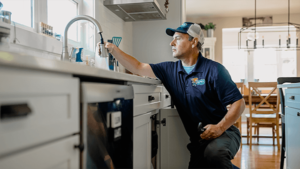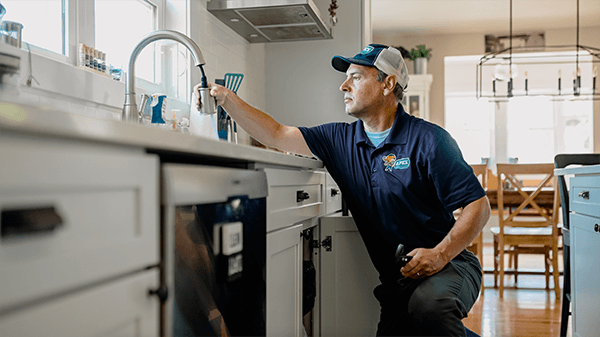Brookhaven Plumbing is a complex yet crucial division of building construction. It provides access to clean water, facilitates sanitation and waste removal, ensures efficient heating and cooling, and protects buildings against damaging water damage.
Plumbers are responsible for installing, maintaining, and repairing all plumbing systems. This article will provide a detailed look at the many functions of plumbing and why it is so important for construction projects.

Plumbing encompasses a broad range of activities that maintain an adequate water supply in buildings and ensure safe, effective waste drainage. It also includes the installation of fixtures and appliances, such as baths, sinks, toilets, faucets, and water heaters. Plumbers install and repair these systems and venting structures, such as chimneys and flues.
The role of plumbing in residential and commercial buildings is primarily to provide a consistent and reliable source of fresh water and promptly remove waste and sewage. Proper plumbing is essential for public health and hygienic living conditions, and it contributes to a building’s value by increasing its appeal to potential buyers or tenants.
A plumbing system comprises a network of pipes that carry freshwater in and drain wastewater from buildings. The pipes may be made from various materials, such as plastic, iron, or copper. Pipes are joined together using joints that can be either threaded or welded. Some common plumbing fittings include stopcocks, shut-off valves, float-operated valves, and ball valves. The straight sections of plumbing pipes are often called tubing, while bent sections are commonly known as piping.
The function of a plumbing system is supported by a series of fittings, valves, and other devices that connect to the pipes. These fixtures are designed for specific functions, and ensuring they are correctly installed is crucial to their longevity and effectiveness. Fixtures include sinks, taps, toilets, and showers. Other specialized fixtures include dishwashers, washing machines, and fire sprinkler systems.
Although plumbing can be considered a highly technical trade, there are a number of basic principles that all plumbers must understand. These principles include the laws of gravity, pressure, and water seeking its level. Understanding these basics can help plumbers make better decisions and avoid costly mistakes.
A plumber’s work can be physically demanding, and it requires a high level of skill to be performed safely. Plumbers must be comfortable working in tight spaces and with potentially hazardous materials. They must also follow strict safety regulations when installing, maintaining, and repairing plumbing systems in commercial and industrial buildings.
A wide variety of materials may be utilized in plumbing systems in both homes and commercial buildings. These include copper, CPVC, PVC, and PEX pipes. Each of these carries its own set of benefits and drawbacks. A plumber may choose one or the other based on the requirements of an individual project.
Generally, copper pipes are utilized in areas with high water pressure. It is a durable material that can endure corrosion and temperatures. It is also resistant to many different chemicals. However, it is more expensive than other piping types and requires each joint to be soldered.
Brass pipes are another common option in plumbing. While these can be used for hot and cold water lines, they are most commonly seen in drain and sewage systems. While these pipes are not as resilient as copper, they are still durable and easy to work with. However, it is important to make sure that any brass pipe does not contain any lead.
Polybutylene (PB) pipes were popular for plumbing from the late 1970s to the mid-1990s. While these pipes are less durable than copper, they are cheaper and work well in various applications. However, it is important to remember that PB pipes are prone to leakage at the joints.
Recently, some homeowners have chosen to repipe their houses with PEX pipes. This type of plastic is similar to CPVC, but it is more flexible. This flexibility means it can easily bend around corners and obstacles, making it a good choice for plumbing systems in tight spaces. PEX pipes are also very affordable and have excellent temperature resistance.
Other piping materials no longer commonly used include black iron and galvanized steel. While these were once popular choices for piping, they have been largely replaced by different options. In some cases, these older piping materials can be salvaged and reused if they are in good condition. However, it is always a good idea to consult a professional plumber before doing this.
Plumbing is an essential service that should be performed by a professional who understands how to work safely in such a sensitive area. A plumber has the skills and knowledge to install all plumbing system components, from the piping to the fixtures and appliances. This ensures that each element will function as intended and that water is safe for consumption.
During the plumbing installation process, the plumber will begin by measuring the space where new pipes will run. This will help determine how much pipe is needed and allow for proper valve and fitting placement. Once the measurements have been taken, the plumber will then create a diagram of the piping system and mark out where each piece should be placed.
The plumber will then start laying the pipes. This can be done either inside or outside the building, depending on the layout and requirements of the system. Once the piping is in place, the plumber will test each fixture to ensure it functions properly. If any issues are found, the plumber will fix them immediately.
Once the piping and fixtures have been installed, the plumber will connect them to the sewage and venting systems. This will include running new lines from the house to the sewer tank and from the tank to the vent. The venting system helps to keep the pressure consistent in the pipes and prevents backflow. It also allows the removal of any waste from the pipes and the control of the build-up of harmful materials in the home.
A good plumbing system is crucial for any home or business. It provides clean, potable water for drinking and cooking, removes wastewater, and prevents the spread of disease. Properly functioning plumbing systems also promote hygienic living conditions and increase the value of a property. In addition, plumbing can help to reduce energy costs by conserving water and reducing waste disposal. When installing a new plumbing system, using quality materials and hiring a certified plumber is important to ensure the job is done correctly.
As with any part of your home or workplace, your plumbing needs maintenance. Rather than waiting for a 2 am emergency like a burst pipe or backup sewage, it’s best to have regular maintenance carried out by qualified plumbers who can catch any issues before they develop into bigger problems that cost more money.
Plumbing maintenance covers a wide range of procedures, including testing water quality, investigating low water pressure, and identifying the cause of foul odors coming from sinks or drains (which can be caused by clogged pipes or a dried-out P-trap). It also involves servicing toilets, taps, gas appliances, hot water heaters, inspecting sewage and water tanks, as well as checking vents, drains, pumps, and other equipment that’s plumbing related.
Maintenance plumbing can also involve installing a water softening system, which prevents the build-up of corrosive minerals in your pipes that can lead to clogs, blockages, and even pipework corrosion. It can also reduce your utility bills by allowing you to use less water.
Leaks are one of the most common plumbing issues that can result in expensive damage to your home. If left untreated, they can cause flooding, mold, and other health and safety issues. It’s important to have your plumbing regularly inspected and maintained to identify leaks early on and prevent them from worsening.
Aside from avoiding costly repairs, regular plumbing inspections can help you save on energy bills. If you need help figuring out where to start your plumbing maintenance routine, try using the Plumbing Maintenance SOP Template. It’s designed to help you streamline and standardize your plumbing processes and improve productivity. You can also schedule recurring tasks in ClickUp to automatically remind you of important inspections and maintenance activities. For more information, contact us today! We can create a custom plumbing maintenance schedule to suit your needs. We can help protect your investment and keep your property in good condition. We also offer free quotes. We serve homeowners, landlords, and businesses.
